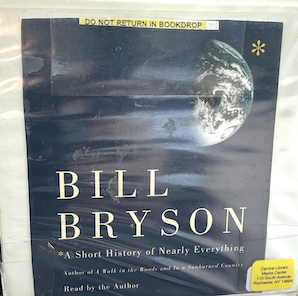Quick Thoughts on A Short History of Nearly Everything

Bryson, Bill. A Short History of Nearly Everything. Penguin Random House Audio Publishing Group, 2006. Audiobook. ISBN 9780739375617 (ISBN10: 073937561X).
My Review: 4/5
A very easy, approachable listen mostly on scientific knowledge up until the title’s publication year of 2003. From an inspection of the universe and the very large to an understanding of atoms and the very small, this book covers a lot of core scientific concepts in a short format. I like that Bryson tried to give accolades to dozens of scientists whom I had never heard of, but what I took away is that if you want to be scientifically remembered, have a constant named for yourself. Be like Planck or Avogadro.
A repeating theme of the book is humanity’s desire for simple explanations of complex processes. Every time someone declares “Yes, we have discovered everything there is to know about subject,” it turns out that just behind a curtain of understanding are whole new fields of study.
Before the theory of plate tectonics and continental drift (which explain how sea fossils ended up on mountain tops or millions of miles apart), contemporaries of the time theorized that land bridges were conveniently inserted on every portion of the globe to “explain” how species traversed such great distances.
Not sure if I really want to pursue more knowledge on prions or quantum states of electrons, but I learned something new in every chapter of the book. Except for people’s names—those have quickly receded behind the tidbits I picked up about #science.
I’m left with two very distinct feelings. One, how amazing is the happy accident of my existence, my immense collection of borrowed atoms and DNA at the culmination of now? Two, if this truly is it, I’d better make the most of it.
Date Read
2025/01/23
Significant Revisions
- Jan 30th, 2025 Originally published on https://www.jsrowe.com with uid BC435B9A-1214-4AF3-A9D6-CB2012D829E7